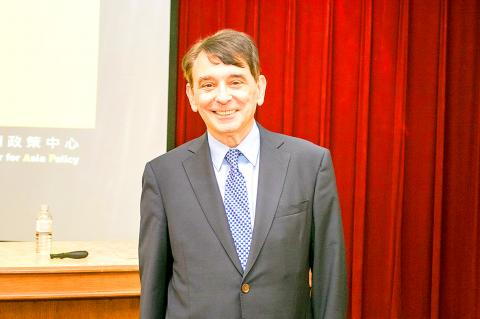Taiwan needs to do more to sell itself to the world, for example by publicizing its achievements in various fields and calling attention to China’s bullying in international media, former American Institute in Taiwan (AIT) director William Stanton said.
He made the remark at a forum in Taipei yesterday when asked how Taiwan should respond to China’s threats in Beijing’s bid to becoming a global hegemony.
“I think you need to undertake much more imaginative public relations with the international community versus what is advocated to people in government,” Stanton said at the forum on Taiwan-US-China relations hosted by Chinese Nationalist Party (KMT) Legislator Jason Hsu (許毓仁).

Photo courtesy of William Stanton
The government could take out full-page advertisements in major newspapers, such as the New York Times, to remind people of what Taiwan has accomplished, he said.
“Taiwan has moved from poverty to prosperity and from a military dictatorship to one of the strongest democracies in the world in just more than 30 years,” Stanton said.
“You rank fourth globally on the Programme for International Student Assessment,” he said. “You rank higher than the US in press freedom and higher than many European countries in academic freedom. You are also ranked one of the safest places in the world, both in terms of countries and cities.”
However, most people he had spoken with do not recognize how high Taiwan ranks in those fields, he added.
“Remind people of what’s at stake if you become just another part of the People’s Republic of China and you wind up like Hong Kong. Remind people of what you’ve achieved on your own. Make the case for why you are important and why the world should care about you,” Stanton said.
Citing as an example threats of a Chinese boycott against Taiwanese coffee bakery chain 85°C (85度C) because an employee at one of its US branches “asked President Tsai Ing-wen [蔡英文] to sign a pillow,” Stanton said the government should respond to such bullying tactics by running full-page editorials in international media explaining the overtures it has made over the past few years, the offers for reasonable conversations and the responses from China to try to bully Taiwanese.
He also cited China’s pressuring of Taiwanese K-pop idol Chou Tzu-yu (周子瑜) in 2016 into issuing an apology for briefly holding up a Republic of China flag on a South Korean variety TV show; its attempt to bar a Taiwanese student from attending a model UN meeting in New York; and Beijing driving away two Fisheries Agency officials at a 2016 UN Food and Agriculture Organization Committee on Fisheries meeting in Rome “because Taiwan is not a country,” saying that all such bullying against Taiwan deserves the attention of the international community.
“There’s many ways in which you can portray yourselves in the positive light you deserve,” Stanton said.

NATIONAL SECURITY THREAT: An official said that Guan Guan’s comments had gone beyond the threshold of free speech, as she advocated for the destruction of the ROC China-born media influencer Guan Guan’s (關關) residency permit has been revoked for repeatedly posting pro-China content that threatens national security, the National Immigration Agency said yesterday. Guan Guan has said many controversial things in her videos posted to Douyin (抖音), including “the red flag will soon be painted all over Taiwan” and “Taiwan is an inseparable part of China,” while expressing hope for expedited “reunification.” The agency received multiple reports alleging that Guan Guan had advocated for armed reunification last year. After investigating, the agency last month issued a notice requiring her to appear and account for her actions. Guan Guan appeared as required,

Japan and the Philippines yesterday signed a defense pact that would allow the tax-free provision of ammunition, fuel, food and other necessities when their forces stage joint training to boost deterrence against China’s growing aggression in the region and to bolster their preparation for natural disasters. Japan has faced increasing political, trade and security tensions with China, which was angered by Japanese Prime Minister Sanae Takaichi’s remark that a Chinese attack on Taiwan would be a survival-threatening situation for Japan, triggering a military response. Japan and the Philippines have also had separate territorial conflicts with Beijing in the East and South China

A strong cold air mass is expected to arrive tonight, bringing a change in weather and a drop in temperature, the Central Weather Administration (CWA) said. The coldest time would be early on Thursday morning, with temperatures in some areas dipping as low as 8°C, it said. Daytime highs yesterday were 22°C to 24°C in northern and eastern Taiwan, and about 25°C to 28°C in the central and southern regions, it said. However, nighttime lows would dip to about 15°C to 16°C in central and northern Taiwan as well as the northeast, and 17°C to 19°C elsewhere, it said. Tropical Storm Nokaen, currently

PAPERS, PLEASE: The gang exploited the high value of the passports, selling them at inflated prices to Chinese buyers, who would treat them as ‘invisibility cloaks’ The Yilan District Court has handed four members of a syndicate prison terms ranging from one year and two months to two years and two months for their involvement in a scheme to purchase Taiwanese passports and resell them abroad at a massive markup. A Chinese human smuggling syndicate purchased Taiwanese passports through local criminal networks, exploiting the passports’ visa-free travel privileges to turn a profit of more than 20 times the original price, the court said. Such criminal organizations enable people to impersonate Taiwanese when entering and exiting Taiwan and other countries, undermining social order and the credibility of the nation’s